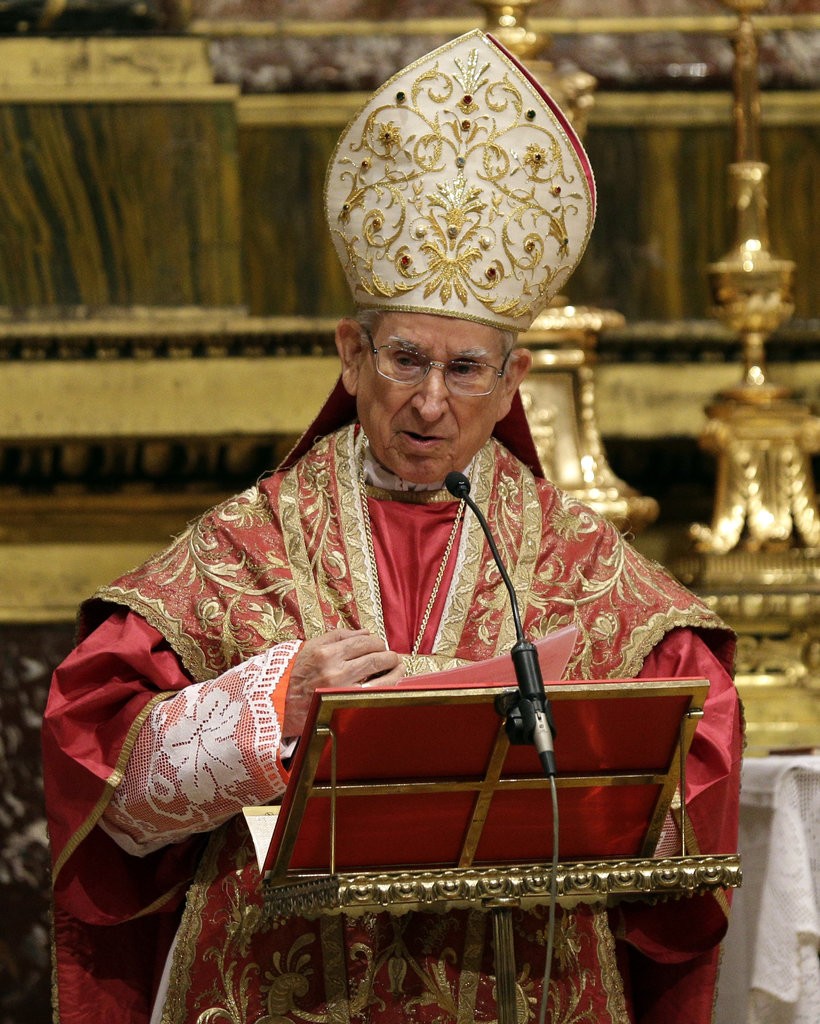Cardinal Dario Castrillon Hoyos, Vatican Conservative, Dies at 88
By Sam Roberts
Cardinal Dario Castrillon Hoyos, a vigorous conservative voice in the Vatican and influential figure in the Latin American church who drew attention for seemingly playing down the church’s sexual abuse scandal, died on Friday in Rome. He was 88. His death was announced by the Vatican, which quoted Pope Francis as calling him a “well-deserving servant of the Gospel.” In 1999, shortly after he was proclaimed a cardinal by Pope John Paul II, Cardinal Castrillon was elegized in a Colombian magazine by Gabriel Garcia Marquez, the Nobel Prize-winning novelist and a fellow countryman, as a “rustic man with the profile of an eagle” and “an unpredictable cross between popular Latin American culture and Renaissance reserve.” Cardinal Castrillon, who spoke eight languages and had a doctorate in canon law, was nothing short of controversial — particularly while he served in Rome as prefect for the Congregation for the Clergy, from 1996 to 2006, and as president of the Pontifical Commission “Ecclesia Dei” from 2000 to 2009. The congregation oversees the ministerial roles of parish priests. The commission supervises the observance of the pre-Vatican II Latin Rite and was created to accommodate disaffected conservative Catholics. In Rome, Cardinal Castrillon advocated for the poor but opposed the arrogation of Christian theology to undergird leftist guerrilla movements in Latin America; sought to reconcile conservative Roman Catholics with the Holy See; and counseled empathy for priests accused of sexual abuse. Before a worldwide reckoning with sexual abuse within the clergy erupted in Boston in 2002, Cardinal Castrillon had suggested as early as 2000 that such abuse was generally an unavoidable fact of life, and that it was being unfairly focused on by lawyers and the media. Was it not contradictory, he asked at a meeting requested by English-speaking bishops, for people to be so outraged by sexual abuse when society also promotes sexual liberation? A decade later, it was revealed that he had sent a letter in 2001, with the approval of Pope John Paul II, praising a French bishop for facing prison rather than delivering a pedophile priest to civil courts. The priest was later sentenced to 18 years’ imprisonment, and the bishop received a three-month suspended sentence. Cardinal Castrillon also opposed the zero-tolerance standard toward abusive priests embraced by bishops in the United States because, he said, it disregarded a fundamental principle of forgiveness. He described the rapport between a bishop and his priests as “not professional but a sacramental relationship which forges very special bonds of spiritual paternity.” Later, he was quoted in an Irish television documentary as urging Irish bishops in 1999 to be “fathers to your priests, not policemen.” In 2001, Pope John Paul empowered the Congregation for the Doctrine of the Faith, headed by Cardinal Joseph Ratzinger, the future Pope Benedict XVI, with direct jurisdiction over sexual abuse cases.
In Colombia, where he was president of the Latin American Bishops Conference from 1987 to 1991, Cardinal Castrillon walked a precarious line between serving his impoverished flock and opposing political groups advocating a class struggle. While he acknowledged that the church in Latin America had only belatedly perceived “with greater clarity the overview of poverty, misery and exploitation,” he argued against so-called liberation theology, but also served as a go-between with the guerrillas. “We can never use hate as a system of change,” he said in 1985, adding: “When I see a church with a machine gun, I cannot see the crucified Christ in that church.” A product of the northeastern city of Medellin, which later became a capital of Columbia’s illicit drug trade, Cardinal Castrillon walked the streets distributing food to the poor. At one point he extracted charity from the drug cartel run by the cocaine kingpin Pablo Escobar. Cardinal Castrillon justified using the cartel’s money by saying it would otherwise have gone to illegal undertakings. (He told cartel members, though, that giving alms “would not save their souls.”) Posing as a milkman, he once audaciously knocked on Mr. Escobar’s door. When Mr. Escobar demanded to know who had sent him, the cardinal replied, “The one who will judge you.” He even pried a confession from Mr. Escobar, who offered to dismantle his drug empire if the president of Colombia promised not to extradite him. Otherwise, he told the cardinal, “if I have to kill the whole of Colombia just to stay here with my wife, I’ll do it without flinching.” His offer was rejected; Mr. Escobar was killed by the Colombian police in 1993. The cardinal also persuaded the pope in 2007 to issue an edict granting priests permission to celebrate the old Latin Mass, its pre-Vatican II form. In 2008, he became the first cardinal to celebrate Tridentine Mass, as it was called, in 40 years. As president of the Pontifical Commission, Cardinal Castrillon was instrumental in Pope Benedict’s decision in 2009 to revoke the excommunication of four traditionalist bishops of the Society of Saint Pius X, including one, it turned out, who, apparently unbeknown to the cardinal or the pope, had denied the scope of the Holocaust. When Cardinal Castrillon retired later that year, shortly after he turned 80, the pope subordinated the Pontifical Commission under the Congregation for the Doctrine of the Faith, apparently in response to a backlash over the bishops’ reinstatement. Dario del Nino Jesus Castrillon Hoyos was born on July 4, 1929, in Medellin, Colombia, to Manuel Castrillon Castrillon and Maria Hoyos Salas. He studied in local seminaries and received a doctorate in canon law at Rome’s Pontifical Gregorian University. He was ordained to the priesthood in 1952, named coadjutor bishop of Pereira by Pope Paul VI in 1971, head of the diocese five years later and archbishop of Bucaramanga, in north-central Colombia, in 1992. Information on survivors was not available.
|
.
Any original material on these pages is copyright © BishopAccountability.org 2004. Reproduce freely with attribution.

